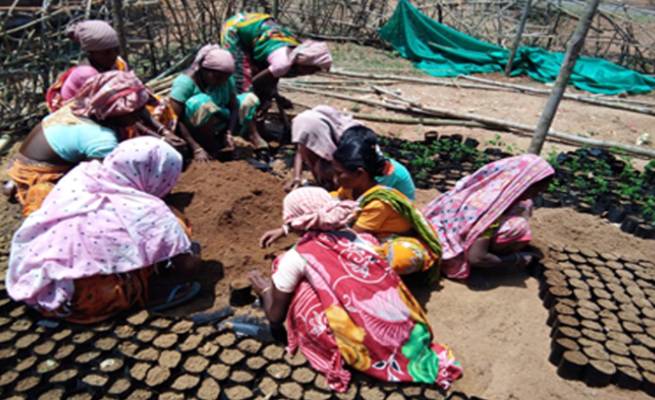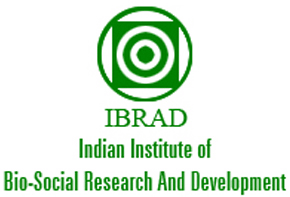IBRAD Centre of Excellence
IBRAD (Indian Institute of Bio Social Research and Development), established in 1985 is a professional society registered under Society Registration Act. It has been founded by professionals and its life members are from University, IIT, IFS, scientists and consultants for national and international research and development activities. It has now been recognized as a Centre of Excellence for Sustainable Tribal Development of the Ministry of Tribal Affairs, Government of India since 2019. It has been engaged in action research, training, development and impact evaluation studies in the sectors of forest, agriculture, horticulture, water, livelihood and rural development covering more than 10 states of India. The focus area of our activities include
Integrated Landscape Management for Sustainable Livelihood development with particular emphasis on Particularly Vulnerable Tribal Groups (PVTGs) and forest fringe tribal population.
Biodiversity Conservation, Ecosystem Services Improvement and Sustainable Livelihood Development.
Sustainable Livelihood and Entrepreneurship Development among the marginal sections of the society and forest fringe dwellers.
Climate Change Adaptation, resilience building and restoration of degraded landscapes.
Sustainable Agriculture, Food and Livelihood Security.
Integrated Tribal Development and Empowerment of women and youth.
The Founders of IBRAD
The life members of IBRAD are from Anthropological Survey of India, different Universities, Indian Institute of Technology, Indian Forest Service Officers, scientists from Indian Statistical Institutes and Government departments.
Training at National Level – A record
IBRAD has been conducting training for the Indian Forest Service Officers sponsored by the Ministry of Environment, Forest and Climate Change since 1991 and without any break which is a record.
It has experience of working with the forest departments of more than 10 states of India and conducted training for the officials, staff members and forest fringe communities in more 15 states of India
Recognition of the action research by the academicians
The publication based on action research on ‘Ecosystem Restoration for Tribal Development’ is recognised by the academicians like Dr. Mamphela Ramphele, Former Vice Chancellor of at the University of Cape Town and former one time Managing Director of World Bank.

Recognition of IBRAD Model by Government of India
The IBRAD Model of Ecosystem Restoration for improvement of ecosystem services are recognised by the Ministry of Environment, Forest and Climate Change, Government of India and issued an order File No. 3 – 5/2021-RT on the 9th Aug 2021 to all the States with a request to utilise services of IBRAD for the training of their frontline staff.
The Ministry of Environment, Forest and Climate Change, Government of India has also issued order to use the experiences of IBRAD on Digital Ethnography for Sustainable Tribal Development.
Partner of International Consortium
Research findings of the institute on measuring the effectiveness of the Joint Forest Management Committees in India has been referred in the Xth Five Year Plan Document.
Research of IBRAD referred in the Five Year Plan Document
Research findings of the institute on measuring the effectiveness of the Joint Forest Management Committees in India has been referred in the Xth Five Year Plan Document.
Study of NTFP of IBRAD referred in the Policy Document of the World Bank
The study on NTFP (Non Timber Forest Produces) and its contribution to household economy is referred in the Policy Document of World Bank.
Methods of Integrated Landscape Management developed by IBRAD is recognized by ICAR
The methods of Integrated Landscape Management for Sustainable Livelihood Development developed by IBRAD has been accepted by the Apex scientific bodies in India like Indian Council of Agriculture Research
Academic programs
IBRAD is organising One Year Post Graduate Diploma in Sustainable Tribal Development Management in collaboration with Sidho-Kanho-Birsha University. It has also organized Full Time AICTE approved MBA program with specialization in Sustainable Development, affiliated under the West Bengal University of Technology.
Methods accepted by European Union
sponsored OpenNESS project
The Eco Chain method developed by IBRAD for Participatory Biodiversity Management is accepted under European Union funded OpenNESS project. Refer
https://oppla.eu/sites/default/files/uploads/methodfactsheetecochain.pdf
Training conducted in foreign countries
IBRAD was invited and has been conducting training in different countries like UK, USA, Finland, Germany, Indonesia, China, Nepal etc since 1994.
Academic collaborations with different Foreign Universities
IBRAD has conducted different study projects with the Australian National University, University of Eastern Finland, Nottingham University, Kings College, London. Besides IBRad also had MoU with the University of Nottingham and the University of Milan Bicocca for Winter Schools, students and faculty exchange. Students from the reputed foreign universities and institutes like Kings College London, Edinburg University, University of Milan Bicocca have pursued their internship, PhD program based on the concept and approaches developed by IBRAD and have participated in the Winter School.
Invited Lectures at international level
The resource persons of IBRAD are and invited to deliver lectures at different international bodies including at FAO Rome as a special invitee
Coordinating an International Network
– SEPARN (Socio Ecological Participatory
Action Research Network)
The institute is coordinating an international network SEPARN with academicians, action researchers and practitioners from Europe, USA, Asia and Africa.
Published more than 100 research papers
in hi index journals with citations
The action research findings of IBRAD are published in the form of scientific papers in the hi index journals with number of citations. Please refer
https://scholar.google.com/citations?user=PkJB7s4AAAAJ&hl=en, https://www.researchgate.net



